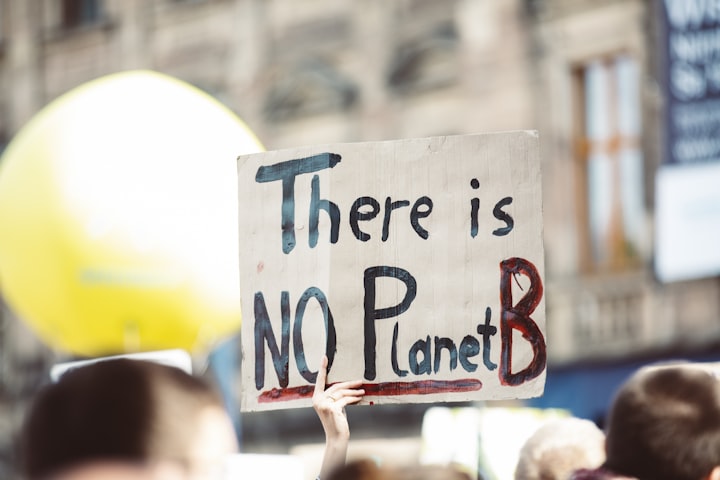Climate change
Understanding, Impacts, and Solutions

Introduction
Climate change is one of the most pressing issues facing humanity in the 21st century. Over the past century, human activities have significantly altered the Earth's climate system, leading to a range of environmental, social, and economic impacts. In this comprehensive exploration, we will delve into the science behind climate change, its far-reaching consequences, and the urgent need for collective action to mitigate its effects and build a more sustainable future.
The Science of Climate Change
At the heart of climate change lies the enhanced greenhouse effect, a phenomenon driven by the increased concentration of greenhouse gases (GHGs) in the Earth's atmosphere. These gases, including carbon dioxide (CO2), methane (CH4), and nitrogenous oxide (N2O), trap heat from the sun, preventing it from escaping back into space. While this natural process is essential for maintaining Earth's temperature within a habitable range, human activities, particularly the burning of fossil fuels, deforestation, and industrial processes, have intensified the greenhouse effect, leading to global warming.
The evidence for anthropological climate change is overwhelming. Scientists have been monitoring various indicators of climate change, including rising global temperatures, melting ice caps and glaciers, shifting precipitation patterns, and rising sea levels. The Intergovernmental Panel on Climate Change (IPCC), a leading international body of climate scientists, has consistently warned about the risks associated with unchecked climate change and the need for immediate action to limit its impacts.
Impacts of Climate Change
The impacts of climate change are already being felt around the world, with profound consequences for ecosystems, economies, and human societies. One of the most visible effects is the increase in extreme weather events. Heatwaves, storms, floods, and droughts have become more frequent and severe, leading to loss of lives, destruction of infrastructure, and disruptions to food and water supplies.
Melting ice caps and glaciers are contributing to rising sea levels, threatening coastal communities with inundation and erosion. Small island nations and low-lying coastal areas are particularly vulnerable to the effects of sea-level rise, with the potential for widespread displacement and loss of livelihoods.
Changes in precipitation patterns are impacting agriculture and water resources, leading to crop failures, reduced yields, and water scarcity in many regions. Shifts in temperature and rainfall are also affecting ecosystems, disrupting biodiversity, and exacerbating the loss of habitat and species extinction.
Social and economic disparities exacerbate the impacts of climate change, with marginalised communities often bearing the brunt of its effects. Indigenous peoples, smallholder farmers, and low-income populations are disproportionately affected by climate-related disasters and face greater challenges in adapting to changing conditions.
Mitigation and Adaptation Strategies
Addressing climate change requires a multifaceted approach that encompasses both mitigation and adaptation strategies. Mitigation efforts aim to reduce greenhouse gas emissions and limit the extent of global warming, while adaptation focuses on building resilience to the impacts that are already inevitable.
Transitioning to a low-carbon economy is central to mitigation efforts. This involves phasing out fossil fuels in favour of renewable energy sources such as solar, wind, and hydroelectric power. Investing in energy efficiency, improving transportation infrastructure, and promoting sustainable land use practices are also key components of mitigating climate change.
Adaptation measures vary depending on the specific vulnerabilities and needs of different regions and communities. Enhancing disaster preparedness and early warning systems, implementing climate-smart agriculture practices, and investing in resilient infrastructure are critical for building adaptive capacity and reducing the risk of climate-related disasters.
International Cooperation and Policy Frameworks
Addressing climate change requires coordinated action at the global level. The Paris Agreement, adopted in 2015 by nearly 200 countries, represents a historic milestone in international efforts to combat climate change. The agreement aims to limit global warming to well below 2 degrees Celsius above pre-industrial levels, with efforts to limit it to 1.5 degrees Celsius. Each participating country has committed to developing and implementing national climate action plans, known as Nationally Determined Contributions (ND-Cs), to reduce greenhouse gas emissions and build resilience to climate impacts.
However, achieving the goals of the Paris Agreement will require enhanced ambition and accelerated action from all sectors of society. Governments must strengthen their ND-Cs and implement policies that align with the objectives of the agreement. The private sector also has a crucial role to play in driving innovation and investment in clean technologies and sustainable practices.
Individual Action and Community Engagement
While government policies and international agreements are essential for addressing climate change, individual actions also play a significant role in driving change. Simple steps such as reducing energy consumption, conserving water, minimising waste, and supporting sustainable products and businesses can collectively make a difference.
Community engagement and grassroots movements are also vital for raising awareness, mobilising support, and driving local action on climate change. From community-led renewable energy projects to sustainable transportation initiatives, local efforts can contribute to broader transitions towards a more sustainable and resilient future.
Conclusion
Climate change poses a profound threat to the planet and its inhabitants, but it is not an insurmountable challenge. By understanding the science behind climate change, acknowledging its impacts, and embracing collective action, we can mitigate its effects and build a more sustainable future for generations to come. It is imperative that we work together, across borders and sectors, to address this urgent global issue and safeguard the health and well-being of the planet and its people.
About the Creator
Chibuzor Eneh
I love giving important information





Comments
There are no comments for this story
Be the first to respond and start the conversation.